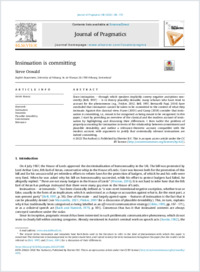Insinuation is committing
BLE-BLL
- Oswald, Steve ORCID University of Fribourg
- 05.08.2022
Published in:
- Journal of Pragmatics. - Elsevier BV. - 2022, vol. 198, p. 158-170
English
Since insinuation - through which speakers implicitly convey negative ascriptions nonovertly (Bell, 1997) - is in theory plausibly deniable, many scholars who have tried to
account for the phenomenon (e.g., Fricker, 2012, Bell, 1997, Bertucelli Papi, 2014) have
concluded that insinuators cannot be taken to be committed to the content of what they insinuate. Against this classical view, Fraser (2001) and Camp (2018) consider that insinuation is committing, i.e., meant to be recognised as being meant to be recognised. In this paper, I start by providing an overview of the classical and the modern account of insinuation by highlighting and discussing their differences. I then tackle the problem of
properly accounting for insinuation in terms of the relationship between commitment and plausible deniability, and outline a relevance-theoretic account, compatible with the
modern account, with arguments to justify that contextually relevant insinuations are
indeed committing.
account for the phenomenon (e.g., Fricker, 2012, Bell, 1997, Bertucelli Papi, 2014) have
concluded that insinuators cannot be taken to be committed to the content of what they insinuate. Against this classical view, Fraser (2001) and Camp (2018) consider that insinuation is committing, i.e., meant to be recognised as being meant to be recognised. In this paper, I start by providing an overview of the classical and the modern account of insinuation by highlighting and discussing their differences. I then tackle the problem of
properly accounting for insinuation in terms of the relationship between commitment and plausible deniability, and outline a relevance-theoretic account, compatible with the
modern account, with arguments to justify that contextually relevant insinuations are
indeed committing.
- Faculty
- Faculté des lettres et des sciences humaines
- Department
- Département d'anglais
- Language
-
- English
- Classification
- Language, linguistics
- License
- Open access status
- hybrid
- Identifiers
-
- DOI 10.1016/j.pragma.2022.07.006
- ISSN 0378-2166
- Persistent URL
- https://folia.unifr.ch/unifr/documents/323461
Statistics
Document views: 178
File downloads:
- 2022-oswald-insinuationjop: 367
